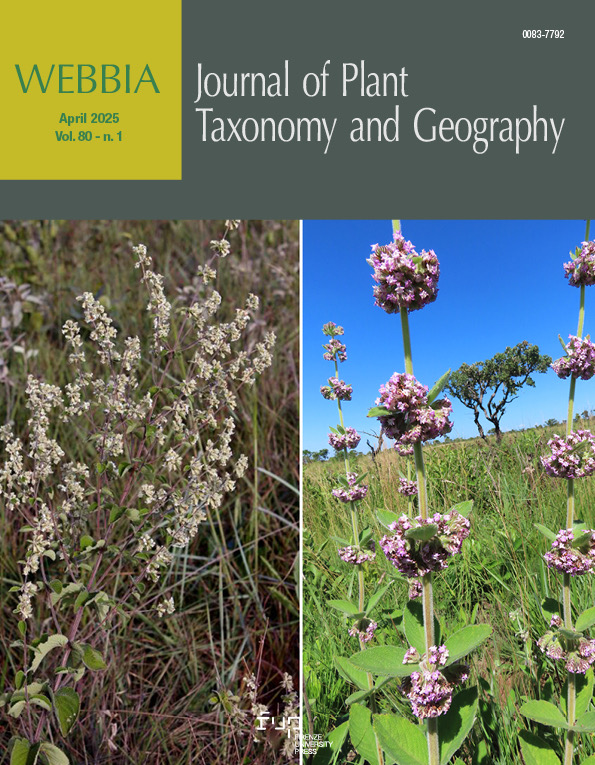Published 2025-04-17
Keywords
- Cagdianao,
- taxonomy,
- threatened taxa,
- narrow endemic,
- ultramafic soils
- Rubioideae ...More
How to Cite
Copyright (c) 2025 Jorge Anton D. Ordas, Yen-Ting Chen, Eiana Joshier A. Odulio, Genea Nichole G. Cortez, Sarah Grace S. Zamudio, Niña Kathryn G. Alfeche

This work is licensed under a Creative Commons Attribution 4.0 International License.
Abstract
Psychotria alejandroi and P. nitidifolia, two new species from Dinagat Island, Philippines, are described and illustrated. Both species belong to the Pilosella species group sensu Sohmer and Davis (2007), characterized by inflorescences with defined axes bearing sessile flowers and fruits. Psychotria alejandroi is similar to P. pilosella but can be distinguished by having truncate, lobed stipules with its inner lobes extending into long aristae, lanceolate to narrowly ovate leaves that are coriaceous and scabrous, longer inflorescences (2–4 cm long), bracts with entire margins, 5- to 6-merous flowers, and weakly ribbed pyrenes with weakly ruminate endosperms. Psychotria nitidifolia resembles P. castroi but differs by its smaller habits (0.6–1.5 m), shorter petioles ((0.8)1.3–1.7 cm), smaller leaves ((4.0)9.2–11.2 cm × (1.5)3.2–3.9 cm), blades drying dark khaki brown, monochotomous to trichotomous inflorescences, prolate fruits with smaller, obscure calyx lobes (0.2–0.3 mm), and strongly ridged pyrenes with weakly ruminate endosperms. Field images, a distribution map, and an identification key to the Psychotria species (Pilosella group) occurring on Dinagat Island are also provided. Based on the IUCN categories, the two new species are evaluated as critically endangered (CR). The discovery of these species highlights the urgency for further biological explorations and to conserve the remaining forested habitats of Dinagat Island, as this area serves as the only sanctuary for a multitude of narrowly endemic species.
References
- Amoroso VB, Acola MS, Guiang MMM, Acma FM, Fritsch PW, Coritico FP. 2023. A new species of grass fern, Schizaea erecta (Schizaeaceae), from Dinagat Island, Mindanao, Philippines. Phytotaxa. 618(3): 265–273. https://doi.org/10.11646/phytotaxa.618.3.4 DOI: https://doi.org/10.11646/phytotaxa.618.3.4
- Andersson L. 2002. Relationships and generic circumscriptions in the Psychotria complex (Rubiaceae, Psychotrieae). Systematics and Geography of Plants. 72: 167–202. https://doi.org/10.2307/3668767
- Bachman S, Moat J, Hill AW, de la Torre H, Scott B. 2011. Supporting red list threat assessments with GeoCAT: Geospatial conservation assessment tool. ZooKeys. 150: 117–126. https://doi.org/10.3897/zookeys.150.2109 DOI: https://doi.org/10.3897/zookeys.150.2109
- Batuyong MAR, Calaramo MA, Alejandro GJD. 2021. Rediscovery and amended description of Psychotria palimlimensis (Rubiaceae): A rare species found only in Ilocos Norte, Philippines. Nordic Journal of Botany. 39 (7): e03253. https://doi.org/10.1111/njb.03253 DOI: https://doi.org/10.1111/njb.03253
- Bautista MAC, Chua-Mangussad V, Cervancia J, Bustamante RAA. 2024. Psychotria pendens (Rubiaceae, Psychotrieae), a new ultramafic species from Central Palawan, Philippines. Phytotaxa. 649(3): 252–260. https://doi.org/10.11646/phytotaxa.649.3.2 DOI: https://doi.org/10.11646/phytotaxa.649.3.2
- Beentje H. 2016. Plant glossary. 2nd ed. United Kingdom (UK): Kew, Royal Botanical Gardens.
- Berger A. 2023. Solved at last: The Philippine endemic Psychotria philippensis is a synonym of Scyphiphora hydrophylacea (Rubiaceae, Scyphiphoreae). PhytoKeys. 221: 95–116. https://doi.org/10.3897/phytokeys.221.97766 DOI: https://doi.org/10.3897/phytokeys.221.97766
- Biag RD, Alejandro GJD. 2020. Rediscovery of Psychotria species, subspecies, and varieties collected in the 1990s and new records of Antirhea benguetensis (Elmer) Valeton and Ixora longifolia Smith (Rubiaceae) in Northern Sierra Madre Natural Park, Luzon, Philippines. Biodiversitas. 21(10): 4524–4535. https://doi.org/10.13057/biodiv/d211059 DOI: https://doi.org/10.13057/biodiv/d211059
- Biag RD, Alejandro GJD. 2022. Range extension and emended description of the threatened Psychotria catanduaniensis (Rubiaceae) in the coastal area in Palanan, Isabela, Luzon, Philippines. Nordic Journal of Botany. 2022(4): e03422. https://doi.org/10.1111/njb.03422 DOI: https://doi.org/10.1111/njb.03422
- Brady KU, Kruckeberg AR, Bradshaw Jr. HD. 2005. Evolutionary ecology of plant adaptation to serpentine soils. Annual Review of Ecology, Evolution, and Systematics. 36: 243–266. https://doi.org/10.1146/annurev.ecolsys.35.021103.105730 DOI: https://doi.org/10.1146/annurev.ecolsys.35.021103.105730
- Davis AP, Govaerts R, Bridson DM, Ruhsam M, Moat J, Brummitt NA. 2009. A global assessment of distribution, diversity, endemism, and taxonomic effort in the Rubiaceae. Annals of the Missouri Botanical Garden 96: 68–78. https://doi.org/10.3417/2006205 DOI: https://doi.org/10.3417/2006205
- Frodin DG. 2004. History and concepts of big plant genera. Taxon. 53(3): 753–766. https://doi.org/10.2307/4135449 DOI: https://doi.org/10.2307/4135449
- Gentry AH. 1990. Floristic similarities and differences between Southern Central America and Central Amazonia. In Gentry HA (Ed.): Four Neotropical Rainforests. Yale University Press, New Haven, CT, pp. 141–157.
- Herrera CM. 1989. Seed dispersal by animals: A role in angiosperm diversification. American Naturalist. 133: 309–322. DOI: https://doi.org/10.1086/284921
- Lillo EP, Fernando ES, Lillo MJR. 2019. Plant diversity and structure of forest habitat types on Dinagat Island, Philippines. Journal of Asia-Pacific Biodiversity. 12(1): 83–105. https://doi.org/10.1016/j.japb.2018.07.003 DOI: https://doi.org/10.1016/j.japb.2018.07.003
- Nepokroeff M, Bremer B, Sytsma K. 1999. Reorganization of the genus Psychotria and the tribe Psychotrieae (Rubiaceae) inferred from ITS and rbcL sequence data. Systematic Botany. 24(1): 5–27. https://doi.org/10.2307/2419383 DOI: https://doi.org/10.2307/2419383
- Pelser PB, Barcelona JF, Nickrent DL. 2011 onwards. Co’s Digital Flora of the Philippines. Available at: <https://www.philippineplants.org/>. Accessed on: 19 Sep. 2024.
- POWO. 2024. Plants of the World Online Facilitated by the Royal Botanic Gardens, Kew. Available at: <https://powo.science.kew.org/>. Accessed on: 17 Sep. 2024.
- Ordas JAD, Pinarok NAA, Romeroso RB, Alejandro GJD, Banag-Moran CI. 2019. A checklist of Rubiaceae species from Eastern Samar, Visayas, Philippines. Check List. 15(2): 295–312. https://doi.org/10.15560/15.2.295 DOI: https://doi.org/10.15560/15.2.295
- Robinson AS, Zamudo SGS, Caballero RB. 2019. Nepenthes erucoides (Nepenthaceae), an ultramaficolous micro-endemic from Dinagat Islands Province, northern Mindanao, Philippines. Phytotaxa. 423(1): 21–32. https://doi.org/10.11646/phytotaxa.423.1.3 DOI: https://doi.org/10.11646/phytotaxa.423.1.3
- Snow DW. 1981. Tropical frugivorous birds and their food plants: A world survey. Biotropica. 13(1): 1–14. https://doi.org/10.2307/2387865 DOI: https://doi.org/10.2307/2387865
- Sohmer SH. 1978. Morphological variation and its taxonomic and evolutionary significance in the Hawaiian Psychotria (Rubiaceae). Brittonia. 30(2): 256–264. https://doi.org/10.2307/2806660 DOI: https://doi.org/10.2307/2806660
- Sohmer SH, Davis AP. 2007. The genus Psychotria (Rubiaceae) in the Philippine Archipelago. Sida, Botanical Miscellany. 27: 1–247.
- Tamayo MN, Fernando ES, Fritsch PW. 2023. Vaccinium coarctatum (Ericaceae), An ultramafic-obligate new species from the dwarf forest of Mount Redondo, Dinagat Island, Philippines. Edinburgh Journal of Botany. 80: 1–12. https://doi.org/10.24823/ejb.2023.1960 DOI: https://doi.org/10.24823/ejb.2023.1960
- Thiers B. 2024 [continuously updated]. Index Herbariorum: a global directory of public herbaria and associated staff. New York Botanical Garden’s Virtual Herbarium. Available at: <http://sweetgum.nybg.org/ih/>. Accessed on: 1 Mar. 2025.


